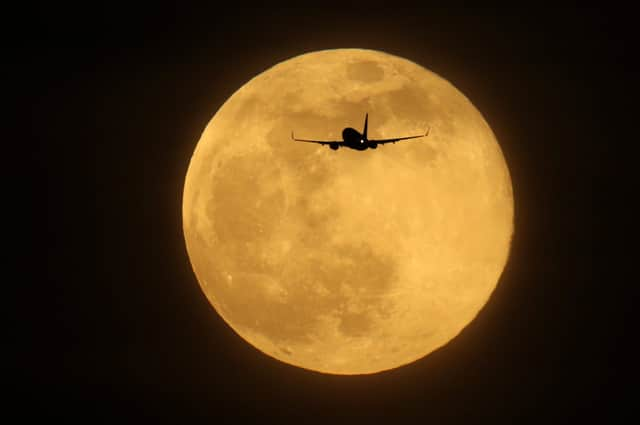Here's when you can see the pink 'supermoon' in the UK - and what it means


The first supermoon of 2021 is set to appear in UK skies this week to the delight of moongazers.
Known as the “pink moon”, April’s full moon gets its unusual name thanks to the time of year that it happens.
Advertisement
Hide AdAdvertisement
Hide AdAnd this month’s full moon will also be the first of two supermoons which will occur this year, with the second appearing in May.
So, what is a supermoon, when will it appear in UK skies - and will it actually be pink?
Here is everything you need to know.
What is a supermoon?
The term “supermoon” was coined by astrologer Richard Nolle in 1979.
Supermoons appear bigger and brighter in the sky because they are slightly closer to the Earth
The effect is due to an optical illusion known as the “moon illusion”, when the observer’s eye is tricked into comparing the moon to the relative size of other objects on the horizon, such as buildings and trees.
Each year, there are about two to four moons that meet the distance threshold.
The April supermoon will pass within 360,000km (224,000 miles) of the Earth, meaning the lunar surface will appear 14 per cent larger and 30 per cent brighter than some previous full moons.
This means the pink moon will be the brightest full moon of 2021 so far.
Advertisement
Hide AdAdvertisement
Hide AdWhen will the pink moon appear?
You will be able to spot the pink moon at any time during the night of Tuesday 27 April in the UK.
It will peak at 4:31am, which is the moment that the moon will appear at its biggest and brightest due to reflecting the maximum amount of sunlight onto the Earth.
The supermoon will then set at 6.04am.
However, there is no rush to see the pink moon for yourself, as it will also appear full for another two or three nights after this.
It will be visible from any part of the UK as long as there is no really cloudy weather.
Will the supermoon actually be pink?
Although April’s full moon is called the pink moon, it won’t actually be a different colour.
Instead, many believe that the name was given to this month’s full moon by Native American tribes, who have their own names for the moon as a way to keep track of time.
Many of these names are associated with springtime signs, like the blooming of flowers.
In particular, this full moon was given its name after the early spring blooms of the Phlox subulata plant - a type of pink moss found in eastern North America.
Advertisement
Hide AdAdvertisement
Hide AdBut in the right conditions, the moon can sometimes look like it has a pink hue due to clouds, dust or air pollution in the atmosphere distorting the sun’s light which reflects off the moon towards the Earth.
The moon can also slightly change colour depending on where it appears in the sky due to the curvature of the Earth, according to Dr Darren Baskill, physics and astronomy lecturer at the University of Sussex.
As blue light, which has a shorter wavelength, “bends” more than red light, not as much of it will reach your eye if you look to the horizon, leaving the more red colours to reach you instead, Dr Baskill said to Science Focus.
So, the pink moon could take on a reddish colour for a short period of time when it appears at certain points in the sky.
The pink moon is also known by other names throughout the world, including the “egg moon” and “moon of blackberry”.